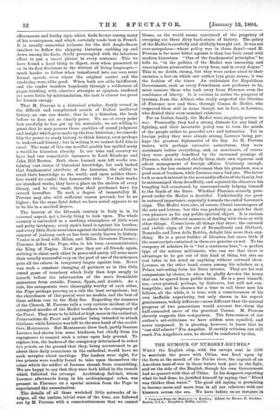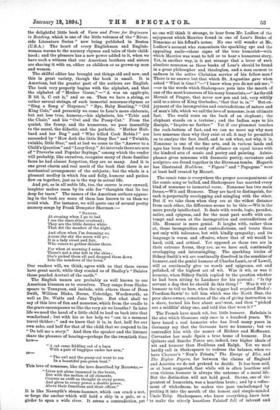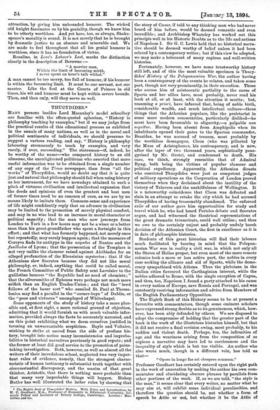THE HUMOUR OF NURSERY-RHYMES.*
• WHEN the English ship, with the envoys sent in l858 to eonclude the peace with China, was fired upon by • the forts at the mouth of the Pei-ho river, the captain of an American man-of-war in those waters took part in the fight, and on the side of the English, though his own Government had no quarrel with that of China. In his despatch reporting what be had done, he justified himself by saying that "Blood was thicker than water," The good old saying is promising to become more and more true in all our relations with our kinsmen across the sea. We have before us an instance in
• Verse and Prose for Beginners in Banding. Edited by Horaaa E. Boadder. Boston, : Houghton, Mifflin, and Co.
the delightful little book of Verse and Prose for Beginners in Beading, which is one of the little volumes of the "River- side Literature Series" now being published in Boston (U.S.A.) The heart of every Englishman and English- woman warms to the nursery rhymes and tales of their child- hood ; and the pleasure has a new power added to it, when we have such a witness that our American brothers and sisters are sharing it with us, either as children or as grown-up men and women.
The skilful editor has brought out things old and new, and this in great variety, though the book is small. It is American, but the greater part of the authors are English. The book very properly begins with the alphabet, and that the alphabet of "Mother Goose," — " A was an apple-pie, B bit it, C cut it," and so on. Then we have a string, or rather several strings, of such immortal nonsense-rhymes as "Sing a Song o' Sixpence," "Bye, Baby Bunting," "Old King Cole," and presently we come to Lear's more elaborate, but not less true, humour,—his alphabets, his "Table and the Chair," and his "Owl and the Pussy-Cat." From the quaint, the funny, and the humorous, we pass insensibly to the moral, the didactic, and the pathetic. "Mother Hub- bard and her Dog" and "Who killed Cock Robin?" are succeeded by "How doth the little Busy Bee" and "Twinkle, twinkle, little Star," and at last we come to the "Answer to a Child's Question" and "Lucy Gray." At intervals there are sets of "Proverbs and Popular Sayings," among which the reader will probably, like ourselves, recognise many of those familiar faces he had almost forgotten, they are so many. And it is one great charm and real merit of the book that there is no mechanical arrangement of the subjects ; but the whole is a pleasant medley in which fun and folly, humour and pathos flow on together, just as is the way in actual life.
And yet, as in all noble life, too, the course is ever onward, laughter makes room by its side for "thoughts that lie too deep for tears." The names of the American authors appear- ing in the book are some of them less known to us than we could wish. For instance, we will quote one of several pretty nursery-songs by Frank Dempster Sherman -- " Mums.
At evening when I go to bed I see the stars shine overhead ; They are the little daisies white That dot the meadow of the night.
And often when I'm dreaming so, Across the sky the moon will go ; It is a lady sweet and fair, Who comes to gather daisies there.
For when at morning I arise, There's not a star left in the skies ; She's picked them all and dropped them down
Into the meadows of the town."
Our readers will, we think, agree with us that these verses have great merit, while they remind us of Shelley's "Daisies those pearled Arcturi of the earth."
The English names are probably as well known to our American kinsmen as to ourselves. They range from Shake- speare to Tennyson, and include, with others, those of Dean Swift, William Blake, Burns, Coleridge, Wordsworth, as well as Dr. Watts and Jane Taylor. But what shall we say of this love of fun and nonsense, which from the cradle to the grave encompasses us like the very air we breathe? In later life we need the hand of a little child to lead us back into that wonderland ; but with his or her help we "can in a moment travel thither ; " and we know that it is, in fact, half for our own sake, and half for that of the child that we respond to its "Do tell me a story." And then the speaker and the listener
share the pleasure of hearing—perhaps for the twentieth time how-
" A cat came fiddling out of a barn With a pair of bagpipes under her arm," "The owl and the pussy-cat went to sea In a beautiful pea-green boat."
This love of nonsense, like the love described by Berowne,— " Lives not alone immured in the brain, But with the motion of all elements, Courses as swift as thought in every power, And gives to every power a double power. Above their functions and their offices."
It is like Nasmyth's steam-hammer, which can crack a nut, or forge the anchor which will hold a ship in a gale, or a girder to span a wide river. It seems a contradiction, yet
or—
no one will think it strange, to hear from Mr. Ludlow of the- enjoyment which Maurice found in one of Lear's Books of Nonsense at his Mend's aortae. No one will wonder at Mr. Ludlow's account who remembers the sparkling eye and the appealing smile—those signs of the true humorist—with which Maurice was wont to tell or to hear a humorous story. Yet, in another way, is it not strange that a lover of such absolute nonsense as these books of Lear's should be found in a great philosopher and theologian, and a man earnest to sadness in the active Christian service of his fellow-men? There is no answer but that which St. Augustine gave when asked "What is time? "—"I know when you do not ask me ; —or in the words which Shakespeare puts into the mouth of one of the most humorous of his many humorists,—" As the old Hermit of Prague, that never saw pen and ink, very wittily said to a niece of King Gorboduc, that that is, is." But en- joyment of the incongruities and contradictions of nature and of man's life, which we call the love of nonsense, is an ultimate fact. The world rests on the back of an elephant; the elephant stands on a tortoise ; and the Indian says to his.
disciple, "Inquire no farther." Yet if our plummet touches. the rock-bottom of fact, and we can no more say why men love nonsense than why they exist at all, it may be permitted us to analyse the fact itself, and to ask what, not why, it is. Nonsense is one of the fine arts, and in various lands an& ages has been found worthy of alliance on equal terms with the kindred arts of music and poetry and painting. Aristo- phanes gives nonsense with dramatic poetry, caricature and sculpture are found together in the Etruscan tombs. Hogarth- has illustrated Hudibras. "Figaro" and " Papageno " were at least half created by Mozart.
The comic tune is everywhere the proper accompaniment of the comic song or ballad, and Shakespeare has married every kind of nonsense to immortal verse. Nonsense has two main forma—Wit and Humour. They are hard to distinguish, for each is perpetually overlapping and mingling with the other. But if we take them when they are at the widest distance from each other, the difference seems to be this :—Wit is the more purely intellectual. It deals with words, logic, paradox, satire, and epigram, and for the most part scoffs with con- tempt and scorn at the incongruities and contradictions of' life. Humour is more geniaL It laughs with, rather than at, those incongruities and contradictions, and treats them not only with tolerance, but with kindly sympathy; and its language is warm and effusive, where that of wit would be hard, cold, and critical. Yet opposed as these two are in their extreme forms, they are, as we have said, continually overlapping and intermingling. The sparkling icicles of- Sidney Smith's wit are continually dissolved in the sunshine of humour, and the genial humour of Charles Lamb, or of Lowell, will as continually give us words and epigrams, cut and polished, of the highest art of wit. Was it wit, or was it humour, when Sidney Smith replied to the question whether he had been sitting to Landseer for his portrait: "Is thy servant a dog that he should do this thing?" Was it wit or humour to tell us how, when the nigger had required Bird-0'. Freedum-Sawin' to tell him which was the North Star, the poor slave-owner, conscious of the sin of giving instruction to a slave, turned his face about 8W-west, and then "picked out a middlin' shiny one, and told him that were it ? "
The French have much wit, but little humour. Rabelais is the aloe which blossoms only once in a hundred years. We have heard a real humorist who has lived many years in Germany say that the Germans have no humour; but we contradict him with the names of Richter and Hoffmann Cervantes has made Spain a true home of humour. Don Quixote and Sancho Panza are, indeed, two higher ideals of wit and humour than Hudibras and Ralph. Yet we need hardly call in Shakespeare to redress the balance, when we have Chaucer's "Nun's Priests," The Essays of Elia, and The Biglow Papers, for between the claims of England and America we do not pretend to decide. It has been said, or at least suggested, that while wit is often heartless and even vicious, humour is always the outcome of a moral life. But the distinction will not hold good. Sterne, one of the greatest of humorists, was a heartless brute; and by a refine- ment of wickedness, he makes vice pass unchallenged by putting it into the mouth of the honest and simple-minded Uncle Toby. Shakespeare, who knew everything, knew how to make the utterly heartless Falstaff full of interest and
attraction, by giving him unbounded humour. The wicked old knight fascinates us by his geniality, though we know him to be utterly worthless. And yet here, too, as always, Shake- speare's morality is sound. It is not merely that he is brought by dramatic justice to an obscure and miserable end. We are made to feel throughout that all his genial humour is worthless, since it has no foundation of virtue.
Rosanne, in Love's Labour's Lost, marks the distinction clearly in the description of Berowne :—
" A merrier man, Within the limit of becoming mirth, I never spent an hour's talk withal."
A man cannot be too merry, too full of humour, if his humour is within the becoming limit. It must be our servant, not our master. Like the fool at the Courts of Princes in old times, his wit and humour must be kept within severe bounds. Then, and then only, will they serve us well.








































 Previous page
Previous page